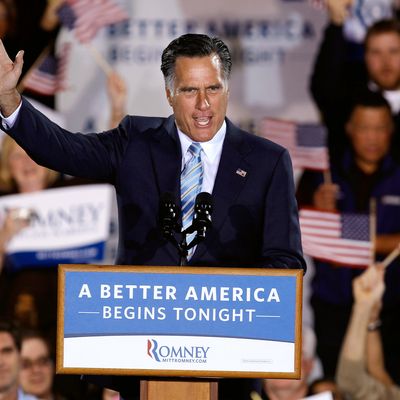
Presidential campaigns often delude themselves about what forces control the fate of the campaign. They believe that the charisma of the candidate, or the force of his ideas, or the tactical brilliance of his advisers hold the key to victory. Mitt Romney’s campaign has had a remarkably consistent and clear-eyed view about this. Romney thinks his chances of winning entirely boil down to voters feeling dissatisfaction with the state of the economy and voting out the incumbent, full stop. Check out these exchanges in National Journal’s Beth Reinhard’s interview with Romney advisor Stuart Stevens. First:
NJ You’ve expressed some frustration with media coverage of the campaign. Do you think it’s been unfair?
Stevens You have this remarkable divergence, at least until recently, of where voters are and where a lot of the coverage has been. If you went and Googled for the last four or five or six months for articles about how much trouble Barack Obama is in and how likely he is to lose, you wouldn’t find much. I think there is an underappreciation of the economic trauma that is still across the country. That’s why you see those incredible statistics that so many people still think we’re in a recession, even though, technically, the recession ended months ago.
Stevens expresses his main beef that the campaign coverage is portraying President Obama as leading, and he believes this is wrong because the economy is still weak. He automatically equates the “economic trauma” resulting from the 2008 crash with Romney’s chances of winning.
Reinhard immediately follows up, asking if he has a way to win without relying on the drag of the economic crisis:
NJ What is your Plan B if the economy continues to improve?
Stevens I think the question will come down to, Do people feel that the country is headed in the right direction? What about their lives has gotten better? The fundamental question is, Do you think the solutions presented by this president have worked and will they work, or is there a better alternative? We’re confident that Governor Romney is presenting a more positive alternative that is much more forward-looking.
You might think the Plan B answer would be that Romney can still win by offering a more persuasive policy vision or proven leadership or something, but no. Plan B in case the economy improves is that the economy is still bad.
Later she asks about the Latino vote:
NJ To close a gap with Hispanic voters, does Romney need to embrace the proposal of Senator Marco Rubio of Florida that would allow the children of undocumented immigrants to attain legal status if they go to college?
Stevens I’m not going to speak to any specific legislation. The economic crisis has hit Hispanics disproportionately hard, and as the campaign goes forward, we will speak to that and speak to it with some more specificity. This dividing of people into these different categories — there’s a lot more that unites American voters these days than divides them. I really think it’s a very backward way of looking way at politics to slice and dice.
This is a policy question — Latinos want immigration reform — but Stevens immediately translates it into an economic fundamentals question: Latinos will vote for us because they’ve suffered economically.
Obviously, Stevens is painting the question in optimistic terms, and he may or may not be right about it. Nobody knows how the economy will perform between now and November, and on top of that, there’s a fair amount of disagreement among election models as to how fast a rate of growth is required. But he is right that Romney has exactly one strategy for winning: being the out party during an economic crisis.






























